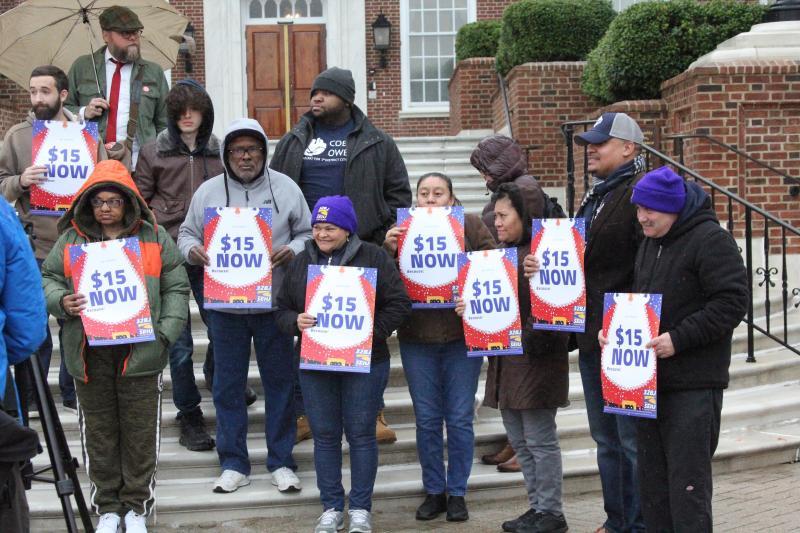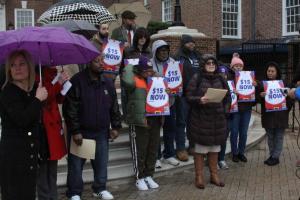A minimum wage increase, gun control and legalizing marijuana, hot button issues left over from last legislative session, are still poised for action this session while a Milton legislator hopes his death penalty bill can finally get a vote.
In May, Rep. Steve Smyk, R-Milton, introduced the latest version of his Extreme Crimes Protection Act – a bill originally introduced in 2017 that has since been revised.
If passed, the bill would bring back the death penalty, which has been on hold since 2016 when the Delaware Supreme Court ruled it unconstitutional, largely because Delaware law allowed a judge, not a unanimous jury, to sentence someone to death.
Although introduced in May and assigned to the House Judiciary Committee, no action was taken on House Bill 165 before the session closed in June.
Smyk said he is optimistic the bill will be heard this session – the last of a two-year General Assembly. With no action, the bill would again die the same way the 2017 bill did, even though it was passed in the House.
“I found out some of the anxieties people had with the bill, and I added some things,” Smyk said.
Mainly, he said, the bill prohibits imposing the death penalty on someone who has been found guilty, but mentally ill. The rest of the bill follows statutory changes the Delaware Supreme Court outlined. These include requiring a jury, not a judge, to unanimously agree on the death penalty. In finding a person guilty, the jury must also unanimously agree beyond a reasonable doubt on at least one aggravating circumstance, and all aggravating circumstances must outweigh all mitigating circumstances.
Smyk said if the bill passes and someone is killed, such as the 2017 murder of a correction officer at Vaughn Correction Center, he has no doubt the death penalty would be used.
In the Senate, Sen. Ernie Lopez, R-Lewes, said he has his eye on a pending Chancery Court decision that could require counties to reassess property in an effort to increase school revenue. Early indications by the judge suggest he wants the Legislature to come up with a solution.
“We are obligated to address this,” Lopez said. “We need to show that we are making meaningful progress.”
Lopez said the days of throwing money at low-achieving school districts that are struggling financially are over. “This is not an option anymore,” he said.
Lopez said he is also following a task force that has been meeting about possibly splitting the Department of Health and Social Services into several organizations.
“That conversation has me concerned,” Lopez said. “I want a laser-like focus to make sure the department has what it needs.”
The task force has been meeting since June, and how the department would be split has not been released. “We know there are challenges in DHSS, but we need to make sure it's going to be an improvement,” Lopez said.
Rep. Ruth Briggs King, R-Georgetown, said education remains a top issue for the Legislature. She co-signed a bill introduced this week that would allow schools to conduct unit counts twice a year. “It’s only done once a year now, and if a school district gets students after Sept. 30, they don’t get credit for those students,” she said. In some districts, she said, the number of new students can reach the hundreds with no additional funding to support them.
Briggs King said she will continue working on government transparency bills, and she hopes her bill on counterfeit airbags gets action this session. “It’s backed by many in the auto industry,” she said.
Speaker of the House Rep. Pete Schwartzkopf, D-Rehoboth, could not be reached about what he expects this session.
Minimum wage bill
Senate Bill 105, which would raise the minimum wage $1 a year until it reaches $15 an hour in 2024, received support Jan. 14 from a Wilmington union representing cleaners and from several legislators. About a dozen cleaning service workers stood in the rain holding “$15 Now” signs as members and officials spoke about the need for all workers in Delaware to make a livable wage.
“Increased wages will mean people are spending more and stimulating the economy from the bottom up,” said Alissa Barron-Menza, vice president of Business for a Fair Minimum Wage.
A livable wage is something that should have been done a long time ago, said Rep. John Kowalko, D-Newark. “To me it's almost immoral that the business community has asked that we not pass a fair minimum wage bill,” he said.
Melissa Steele is a staff writer covering the state Legislature, government and police. Her newspaper career spans more than 30 years and includes working for the Delaware State News, Burlington County Times, The News Journal, Dover Post and Milford Beacon before coming to the Cape Gazette in 2012. Her work has received numerous awards, most notably a Pulitzer Prize-adjudicated investigative piece, and a runner-up for the MDDC James S. Keat Freedom of Information Award.






















































